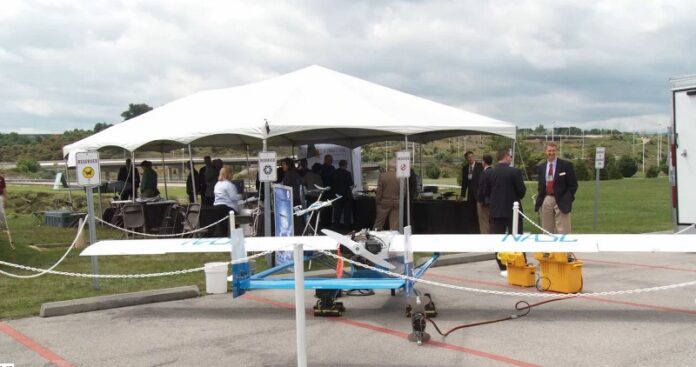
The Mid-Atlantic Aviation Partnership at Virginia Tech has received a Federal Aviation Administration Certificate of Authorization to conduct research flights on Friday, July 17, at a field hospital in Wise, Virginia.
“Important safety and logistical matters needed to be considered by the Federal Aviation Administration as well as all of the government and industry partners working to make this happen,” said Rose Mooney, executive director of the Mid-Atlantic Aviation Partnership at Virginia Tech. “We have painstakingly reviewed the details with the FAA, making sure nothing is overlooked, from the flight plan to even the contents of the medical payload. We needed to demonstrate that we had done our homework to ensure optimum safety.”
Unmanned aircraft will deliver pharmaceuticals and other medical supplies during research flights at a free medical clinic in Wise on July 17.
Flights will involve unmanned aircraft operated by NASA’s Langley Research Center in Hampton, Virginia, and Flirtey Inc., an Australian startup company specializing in “last-mile” delivery using unmanned aircraft systems, also known as UAS.
The Mid-Atlantic Aviation Partnership at Virginia Tech is overseeing the research flights as part of an event called “Let’s Fly Wisely.”
“This is an example of using UAS technology for a socially significant purpose while also opening up economic opportunities,” said Jon Greene, an associate director of the Institute for Critical Technology and Applied Science at Virginia Tech and the acting associate director of the Mid-Atlantic Aviation Partnership. “It is a win-win solution.”
SEESPAN Inc., an aerial interactive media startup company, will also participate in research flights to advance uses of unmanned aircraft in capturing video at the event.
“This is a Kitty Hawk moment not just for Flirtey, but for the entire industry,” said Flirtey Chief Executive Officer Matt Sweeny. “Proving that unmanned aircraft can deliver lifesaving medicines is an important step toward a future where unmanned aircraft make routine autonomous deliveries of your everyday purchases.”
The event will illustrate the challenges of delivering basic health care in rural areas and spotlight Wise County’s role in developing a technology that is expected to grow into a billion dollar industry.
“We have been conducting outreach with the youth here over the past three years in aerospace technologies, which offer a new direction for economic growth in this region,” said Jack Kennedy, the clerk of circuit court for Wise County and the City of Norton. “We want to provide hope for the next generation, and July will be a major milestone.”
On the morning of July 17, a fixed-wing aircraft remotely operated by NASA Langley Research Center pilots will deliver medical supplies to Lonesome Pine Airport in Wise, Virginia. The medical cargo will be transferred in smaller packages to aircraft operated by Flirtey Inc. for delivery to the Wise County Fairgrounds.
This Flirtey aircraft weighs only about 10 pounds and will lower its cargo via tether.
The deliveries will take place during the annual free clinic run by Remote Area Medical and the Health Wagon, a local health care outreach organization. The clinic, held at the fairgrounds, typically serves more than 1,500 patients.
“People who need medicine or even stitches too often have to go without because they live in rural areas where transportation can be a challenge,” said Teresa Gardner, the executive director of the Health Wagon. “This technology could open so many doors for our patients and our community.”
Other partners for the Let’s Fly Wisely July event include the Appalachian College of Pharmacy, Rx Partnership, and Wise County Economic Development.

